connectedcar
Latest
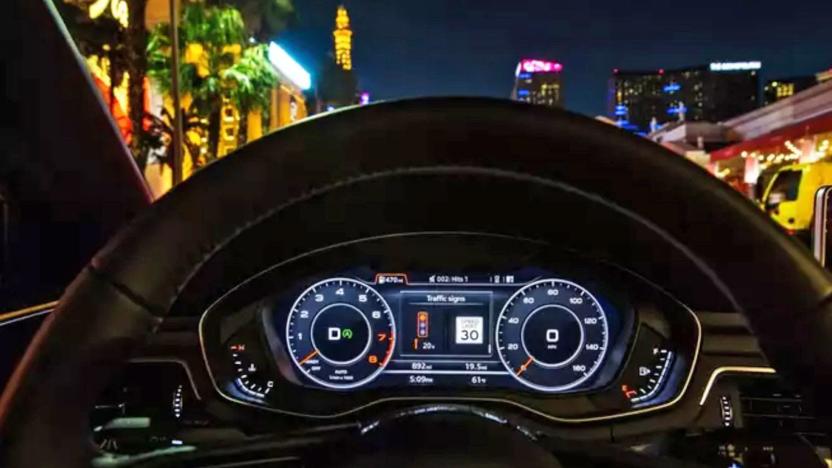
Audi helps you avoid red lights by suggesting speeds
Audi's cars already tell you how long a red light will last, but now they'll help you avoid those red lights in the first place. It's launching the first implementation of the Green Light Optimization Speed Advisory (GLOSA), a system that provides speed recommendations to reduce the amount of time you spend at red lights. The extension of Traffic Light Information technology combines your car's position and traffic light data to calculate an ideal speed that shows up on your vehicle's instrument cluster or heads-up display. In theory, you could save time by driving slightly slower and catching an uninterrupted string of green lights.
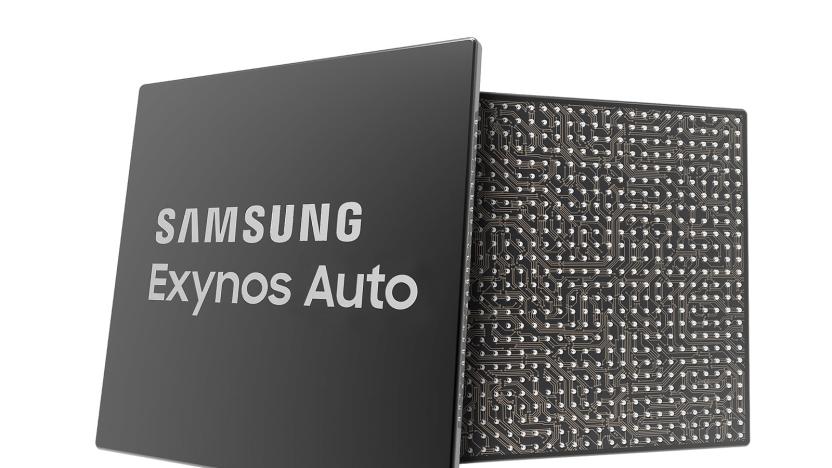
Samsung unveils Exynos chips built for connected cars
Samsung's Exynos processors are no longer confined to mobile devices and the occasional smartwatch. The company has launched Exynos Auto and Isocell Auto brands that will respectively make chips and camera sensors for connected cars. The Exynos line will include chips devoted to specific aspects of on-the-road technology, including driver assistance (Exynos Auto A), infotainment (Auto V) and telematics (Auto T). Isocell sensors, meanwhile, currently include three models that range from 960p to 4K.
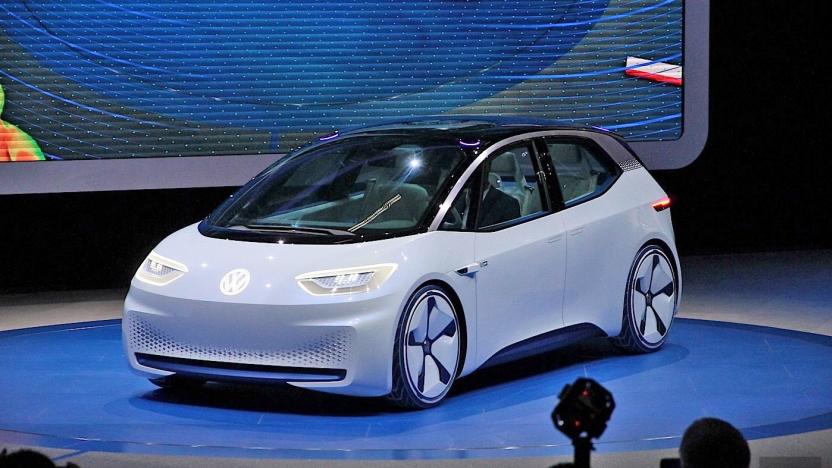
VW and Microsoft team up on cloud services for connected cars
VW's strategy for smarter cars extends beyond creating a single OS for its cars. It wants unified internet services, too. To that end, it's teaming up with Microsoft to build the Volkswagen Automotive Cloud and provide internet features that are consistent across models -- including when you're outside your car. While the two companies haven't delved into the exact features (it's still early going), they envision a scenario where you could resume listening to music when you enter your car, or hop on a conference call while you're commuting to the office. You could also expect tight connections to VW's We services, like car sharing.
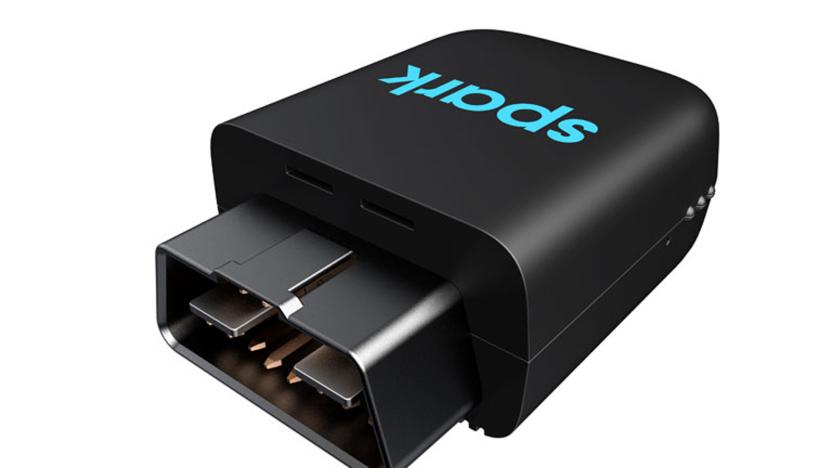
AT&T and Harman bring connected features to your existing car
AT&T is joining the ranks of carriers that can bring a whole suite of connected car technology to older passenger vehicles. It's launching the Harman Spark, an OBD-II dongle that adds diagnostics, tracking and LTE data to cars from 1996 and beyond. Unlike the old ZTE Mobley, this isn't just about internet access. It can alert you to car trouble (including theft), help you find and pay for roadside help and locate your vehicle.
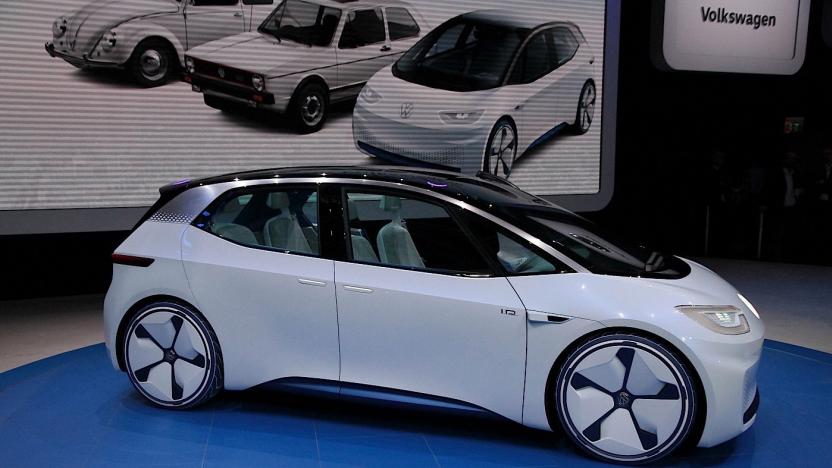
VW's $4 billion connected car push includes its own operating system
VW knows it has to rethink its approach to technology if it's going to adapt to a world full of electric cars, autonomy and ridesharing services, and that extends to the very software that makes those vehicles tick. The automaker has committed €3.5 billion ($4.05 billion) through 2025 for a connected car push that not only moves the company toward a new role as a "mobility services provider," but will include the development of an in-house operating system, vw.OS, that will govern entire vehicles.

Tesla will open its security code to other car manufacturers
Tesla might just get into the habit of releasing source code for its in-car tech. Elon Musk has signaled his intention to post the source code for Tesla's car security software, letting any automaker roll it into their own machines. It would be "extremely important" to ensure the safety of future self-driving cars, he argued, and that's not without merit. You really don't want intruders crashing your car or otherwise causing havoc, especially when you're not at the wheel.

Audi and Huawei team up on connected car technology
Audi is no stranger to developing networked, internet-savvy cars. It still believes it needs a boost, however. To that end, it just signed a memorandum of understanding with Huawei that will see the two companies collaborate on "intelligent connected vehicles." These cars need a fast, reliable data connection, Audi said, and Huawei's involvement is bound to help. They see the alliance helping for everything from autonomous driving through to online services.

BMW, Ford and GM want to bring blockchain to your car
Seemingly every company is determined to hop on the blockchain bandwagon, and that includes automakers. BMW, Ford, GM, Renault and and a string of tech partners (including Bosch and IBM) have formed the Mobility Open Blockchain Initiative, a group that hopes to use blockchain's distributed, decentralized ledger technology across many aspects of your experience, even when you're not driving. They hope to create standards that allow for secure payments for everything from autonomous car hailing to congestion charges to ridesharing.

LG and Here help self-driving cars share their knowledge
Self-driving cars clearly stand to benefit from sharing data -- you want your car to know about traffic jams before you're stuck in gridlock. And LG knows it. The tech giant is partnering with Here on a next-gen communications hub for nearly or completely autonomous cars. Here's location info will help LG share a car's situational awareness with other vehicles, giving you customized driving info and (potentially) smarter decisions. If there's a road ahead with mercifully light traffic, for instance, your car might turn on to it to avoid delays.

Hyundai and Kia will offer AI assistants in 2019 cars
Hyundai and Kia both have reputations as early adopters of in-car tech, and that's truer than ever now that voice assistants are becoming a practical reality on the road. The Korean automakers have revealed that they plan to include AI assistants in their new cars starting from 2019, with every vehicle being 'connected' by 2025. As Hyundai explained, they've been working with SoundHound to create an Intelligent Personal Agent (based on Houndify) that both makes proactive suggestions (such as reminding you of a meeting) and offers remote control of both your car and your home.

Honda’s connected cars will communicate over 5G
When it's not busy making billion-dollar acquisitions to expand its robotics line-up, Japanese mobile carrier SoftBank is pursuing its other hobby: smart cars. Central to this endeavour is its partner, and fellow Japan native, Honda. Last year, the two announced plans to make cars emotive using cloud-based tech based on SoftBank's Pepper robot (think Knight Rider's KITT). The fruits of that colloboration are beginning to emerge, in the guise of the auto-maker's AI-assisted NeuV and Sports EV concepts. With the clock ticking down to Honda's 2025 deadline for driverless cars, the duo are moving on to the next phase in their connected cars project, which is all about 5G.
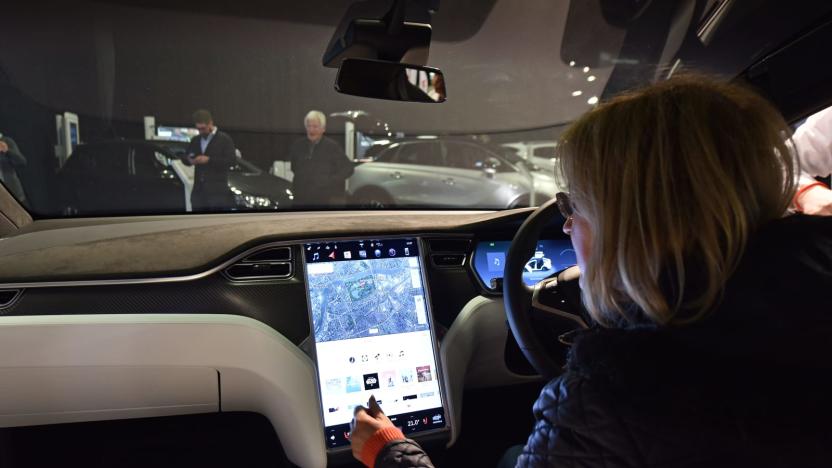
UK issues stricter security guidelines for connected cars
Nervous about the thought of your connected car falling victim to hacks, especially when self-driving cars hit the streets in earnest? So is the British government -- it just issued tougher guidelines for the security of networked vehicles. It wants security to be part of the design process across every partner involved, even at the board of directors' level, and for companies to keep cars updated throughout their lifespans. UK officials also call for a "defence-in-depth" strategy that minimizes vulnerabilities (such as by walling off systems to limit the damage of a hack), and very limited use of personal data that gives you control over what the car transmits.
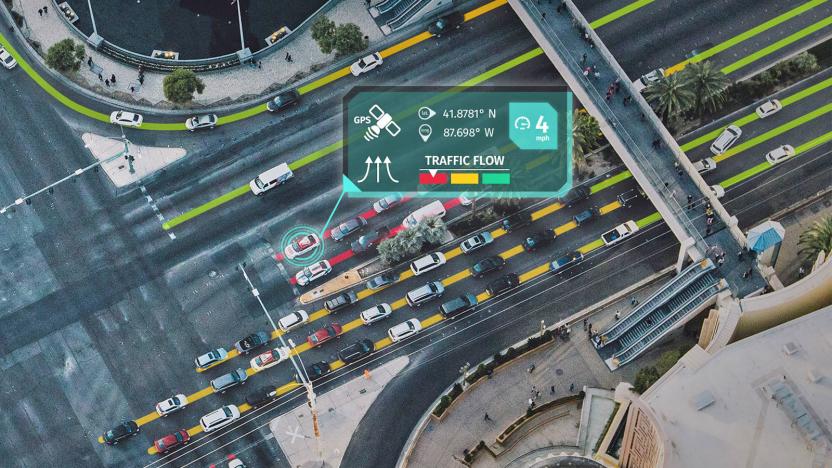
Audi, BMW and Mercedes cars will share live traffic jam data
It's not too hard to find real-time traffic data, but it's usually specific to one car make. Wouldn't it be great if cars of all brands could regularly coordinate? They're not quite there yet, but they're getting closer. Here has unveiled a Real-Time Traffic service that has cars from Audi, BMW and Mercedes-Benz (all co-owners of Here) sharing their live sensor data to provide more accurate traffic alerts than you'd get from external probes alone. It's particularly helpful on 'arterial' roads, Here says. And more than 30 of the 60-plus countries covered by the service can also take advantage of safety warnings based on sensor data you expect from incidents, such as hard braking to avoid a crash.

Self-driving cars to prove their mettle on an Ohio highway
When you think of American states that are crucial to the future of transportation, you probably think of California, Michigan and maybe Nevada. Ohio, however, is determined to put itself on the map. Thanks to a mix of federal and local funds, the state is wiring a 35-mile portion of Route 33 for vehicle-to-infrastructure communication tests. Ideally, this will solve traffic issues by helping connected and self-driving cars talk to both highway systems and each other. With enough test data, these smarter cars could both take better advantage of the available lanes and drive in closely-packed platoons.

Roadside assistance is T-Mobile's latest connected car freebie
T-Mobile's SyncUP Drive dongle has enabled drivers to add 4G LTE connectivity, vehicle diagnostics and GPS monitoring to their older cars since the service rolled out in November. Now, the carrier is adding another feature that should serve subscribers well in cases of emergency: free roadside assistance. T-Mobile has teamed up with AllState Motor Club Roadside Assistance to provide tows, jumps and tire changes via the SyncUP Drive app. In addition, the Uncarrier is also offering a new payment plan that lets you get the $150 Drive dongle for a downpayment of $48 and 24 monthly installments of $2. That is, if you sign up for a 2GB or higher data plan.
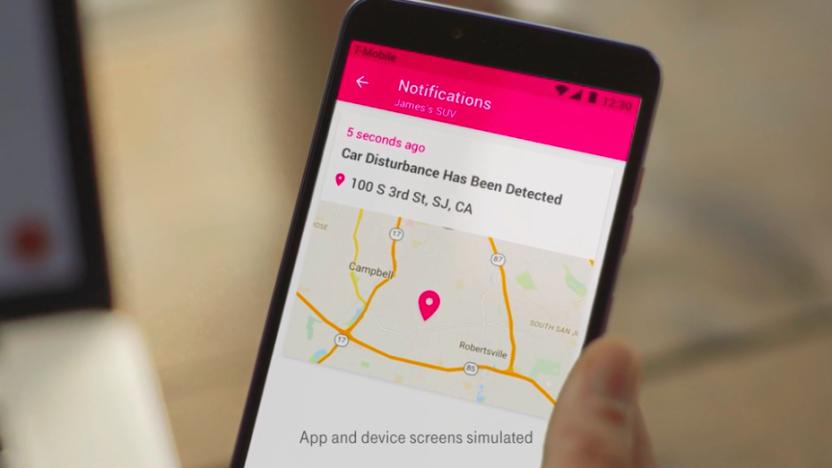
T-Mobile's SyncUP Drive adds 4G LTE to your aging vehicle
For the road warriors and frequent drivers who want a connected vehicle without shelling out for a new car with built-in WiFi, T-Mobile's just announced SyncUP Drive should fill the coverage gap between your cell phone and your home internet. The new device brings the big pink carrier up to speed with competition at AT&T and Verizon (both of which already have similar devices) and adds smart vehicle diagnostic features as well as a phone-free connection to T-Mobile's 4G LTE network.

German cars will share real-time data to help you find parking
However smart your car might be, there's only so much it can tell you by itself. Wouldn't it be nice if cars regularly shared helpful driving info beyond what you offer in mobile apps? Here thinks so. It's launching services that will have cars automatically sharing real-time data to improve commutes for everyone. Vehicles (starting with those from Here owners Audi, BMW and Mercedes-Benz) will use their sensors and cameras to offer details on free parking spaces, traffic conditions, and road hazards. You'd know that a parking spot has opened up, or that heavy rain is forcing drivers ahead to slow down.

Alibaba's first smart car is up for pre-order right now
After more than a year of development, Alibaba's first "internet car," the OS'Car RX5 sport utility vehicle, is available for pre-order in China. The SUV costs the equivalent of $22,230 (as a base price) and deliveries are expected to roll out in August. Alibaba partnered with China's largest automaker, the state-owned SAIC Motor Corp., to develop the new vehicle. The RX5 uses YunOS, the Alibaba operating system that powers its line of smart home appliances, including refrigerators, vacuum cleaners and air conditioners.

Intel's new research group to tackle cybersecurity in connected cars
In order to reduce the risk of future connected car hacks, Intel is assembling a group of researchers to lend a hand. The Automotive Security Review Board (ASRB) will "help mitigate cybersecurity risks associated with connected automobiles while encouraging technological progression and innovation," according to the company's announcement. The board will include "top security industry talent" and the company will provide the group with its latest tech. Intel says the ASRB will conduct on-going testing and audits to discover the "best practices" for the automotive industry which it will publish as new info becomes available. In fact, it already published its first white paper on the topic. The recent Jeep hack (and others) revealed the vulnerabilities for some connected car systems, an industry in which Intel powers systems for BMW, Hyundai, Infiniti, Kia and more. [Image credit: Joe Raedle/Getty Images]

Developers can test Android Auto apps without buying a Bentley
Android Auto developers now have way to try out their apps without spending lots on an actual head unit or entire car. The Android Auto Desktop Unit (DHU) runs on your Windows, OS X or Linux desktop and works in conjunction with the companion app on Android 5.0 (Lollipop) or higher. Installing it is a bit of a rigmarole and you'll need to connect your Android device via a USB cable, but you probably already know that if you're a developer. Once you've compiled and installed your app, it'll "behave as if it's connected to a car," according to Google.





